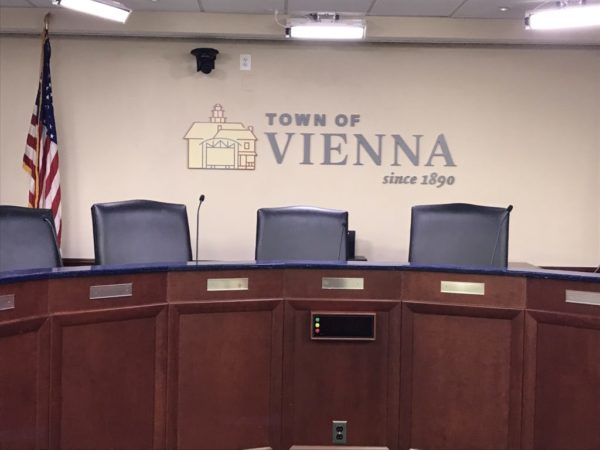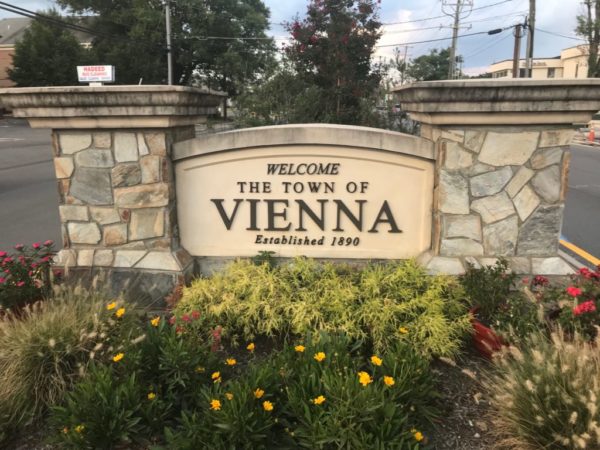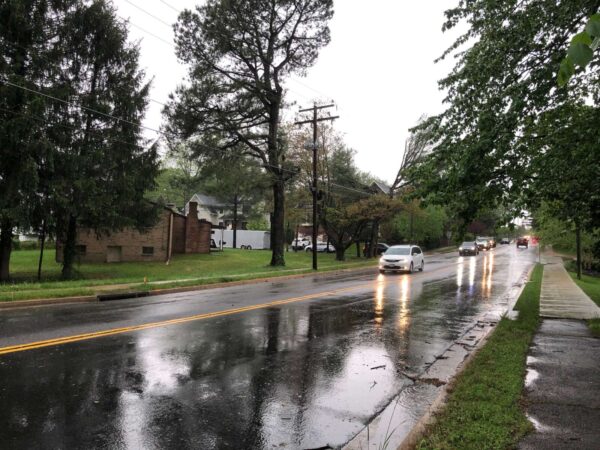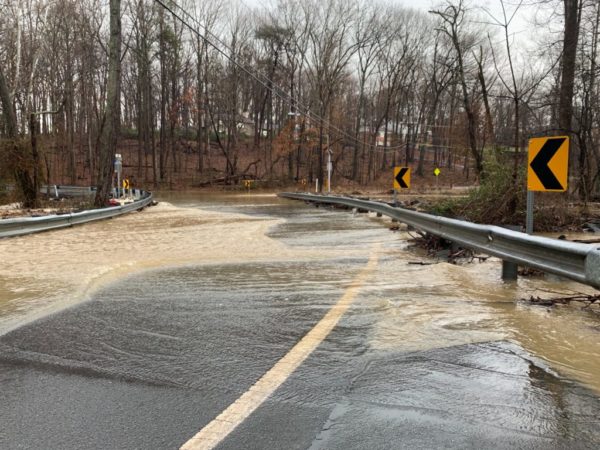Vienna elected officials will discuss how to use the town’s federal COVID-19 relief funds at a meeting next month, though the town council is leaning away from using the money to give essential workers extra pay, Director of Finance Marion Serfass said on Monday (Aug. 30).
The Town of Vienna formally received $8.5 million on July 12 — half of its $17.1 million allotment from the American Relief Plan Act, which is providing the money to help local and state governments respond to the pandemic.
“Any funds that are not expended or that will not be expended on necessary expenditures incurred by December 31, 2024, by the locality…must be returned to the federal government,” Virginia Secretary of Finance Joe Flores noted in a June 9 letter to recipients.
At a public hearing on Monday (Aug. 30), Serfass detailed the limits on how the town can use the money, noting that it can’t independently offer certain services that are provided by the county, such as schools and libraries.
The U.S. Treasury permits localities to spend ARPA funds on four categories, as summarized by the town:
- Category A: Response to the public health emergency and negative impacts of the pandemic, including capital improvements to adapt buildings and maintenance of park space for deferred upkeep and extra use during quarantine periods
- Category B: Premium pay to essential workers and grants to employers of essential workers; the only eligible workers in the town would be sanitation and public safety
- Category C: Provide government services related to revenue reduction from the pandemic
- Category D: Necessary capital investments in water, sewer, or broadband infrastructure, which has been interpreted to involve stormwater
Serfass said that the town so far has informally elected not to allocate funds to category B but added that the issue could be discussed further.
According to Serfass, the government services category has been interpreted to mean any services that the town provides, which could include cybersecurity improvements, for example. She also said a preliminary calculation suggests the town won’t be allowed to spend more than $2.6 million in this area based on federal restrictions.
The public hearing on Monday drew only one speaker, Bob McCahill, who represented the civic group North East Vienna Citizens Association.
McCahill said his group recommends that the town devote money for water and sewer infrastructure to free up capital money for purchases of equipment that could be used to collect and remove leaves in the fall.
“The idea is that the purchased capital equipment would be much more efficient than the current method,” he said.
The NEVCA has advocated for changes to a town-owned property along Beulah Road that is currently used to store leaves and process them into mulch. The group says those operations disturb residents, and the space should be restored back to a park.
McCahill also said the association wants the town to use the federal money to mitigate parking issues.
The town council will deliberate on how to spend the money in a conference session scheduled for 7:30 p.m. on Sept. 20 at Vienna Town Hall.
The public hearing is closed, and there won’t be public comment at the September meeting, but residents are always encouraged to share their thoughts with the mayor and council, town spokesperson Karen Thayer said in an email yesterday (Tuesday).
Residents can email Town Clerk Melanie Clark at [email protected], call her at 703-255-6304, drop off correspondence at the town hall, or contact elected officials directly.
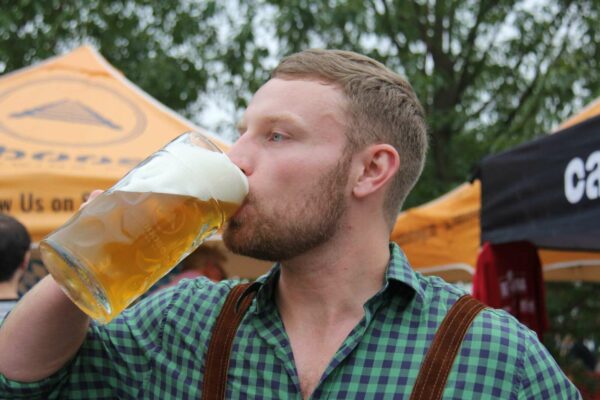
Break out the beer steins and lederhosen.
While the original Oktoberfest in Munich, Germany, has been canceled for a second year in a row, the Town of Vienna is bringing back its iteration of the annual folk festival on Oct. 2 after it got stricken from the calendar last year due to the COVID-19 pandemic.
The Vienna Town Council approved a memorandum of understanding with the Vienna Business Association (VBA), which helps organize the event, as part of the consent agenda in its meeting last night (Monday), setting the terms of their partnership.
Oktoberfest serves as the VBA’s main fundraiser, according to Executive Director Peggy James, who says the revenue it generates is crucial to keeping the organization going and enabling it to maintain low membership fees so that small businesses aren’t excluded.
“Our goal is to have a safe, outrageously fun event that raises lots of money so that the VBA is able to continue to support our community and the wonderful service organizations that help make this Town so special,” James said by email.
Like previous versions of the festival, the 13th annual Vienna Oktoberfest will be held around Church Street and the Town Green. It will last from 11 a.m. to 7 p.m. with a beer and wine garden, food vendors, live music, children’s activities, a marketplace, and more.
Since the novel coronavirus remains a concern, this year’s festival will likely have fewer vendors and more spacing, James says.
Additional measures could include scheduled cleanings in the kids’ area and dining tents, signs and ground markers with social distancing reminders, and a mask requirement for volunteers. If current recommendations hold, masks will be strongly suggested for attendees when they’re not actively drinking or eating.
The VBA’s MOU with the town commits it to adhering to all local, state, and federal health guidelines related to COVID-19.
“If the CDC guidelines change, we are prepared to alter our event to be fully compliant,” James said.
Oktoberfest will benefit from the Town of Vienna’s growing experience with organizing large outdoor events amid the fluctuating conditions of the pandemic, from ViVa Vienna — which became the first event of that scale in Fairfax County when it returned at the end of May — to the 2021 Virginia State Little League Majors Tournament in July.
Most recently, the first Chillin’ on Church block party drew approximately 2,500 people on Aug. 20, according to Town of Vienna Parks and Recreation Director Leslie Herman, who says the return of major events “has gone very well” so far.
“Viva Vienna required extensive planning in order to abide by the regulations of the [governor] of VA and recommendations of the Fairfax County Health Dept and CDC in response to the COVID-19 pandemic,” Herman wrote in an email. “Due to Viva Vienna’s extensive planning, the Vienna Business Association is able to utilize that event’s model should there be similar restrictions in October.”
In past years, Oktoberfest has gotten between 20,000 and 25,000 visitors over the course of a day, according to James.
Organizers anticipate having about 60 vendors, though applications are being accepted until Sept. 7.
Proceeds from wine and beer sales will go to the VBA Foundation, which supports local nonprofits and community service organizations. James says the foundation has especially focused on efforts to address food insecurity over the past 17 months.
Other Oktoberfest revenue, including vendor and sponsor fees, will cover the costs of putting on the festival and help the VBA support other events in the Town of Vienna, including the Halloween Parade and Taste of Vienna.
Organizers say the festival also helps the town by bringing in meals taxes from participating food vendors and attracting visitors.
“Vienna Oktoberfest also attracts visitors from outside the Town of Vienna, thereby showing off our Town and encouraging them to revisit and also to shop/eat at our local businesses,” Oktoberfest Committee Chair Kathy Georgen said by email.
Courtesy Vienna Business Association/Facebook
The Town of Vienna is receiving a huge tranche of money from the American Rescue Plan Act (ARPA), but it’s still unclear where that funding is going.
The Vienna Town Council formally accepted $8.5 million in ARPA funding this year on Monday (July 12). The town is expected to get an identical amount in funding next year.
Marion Serfass, the town’s director of finance, told Tysons Reporter that Vienna staff will be working over the next few months to gather public input to help determine where that funding would be best utilized.
The town will hold a public hearing on Aug. 30 to collect feedback on what issues locals would like to see that funding put toward, and the town council will have a conference on Sept. 20 to pin down a definitive list of where the $8.5 million is going.
Serfass told the town council on Monday that the advice she has received in conferences about the funding is to “take your time, be deliberate, and look at transforming projects.”
Serfass said her office is currently working with the town attorney to pin down what is or isn’t eligible for ARPA funding. The town could also get ideas, she said, for how to proceed from watching where other localities spend their ARPA funds.
Nearby, Alexandria received $29.8 million in its first tranche. The city spent the most — $4 million — on rental assistance and other emergency assistance programs. $3.7 million went to stormwater repairs and $3 million to a pilot program to guarantee a minimum income for city residents.
Looking long-term, Serfass told the town council that there’s no set deadline to spend the funding, giving Vienna room to invest in longer-term programs without putting next year’s tranche of funding at risk.
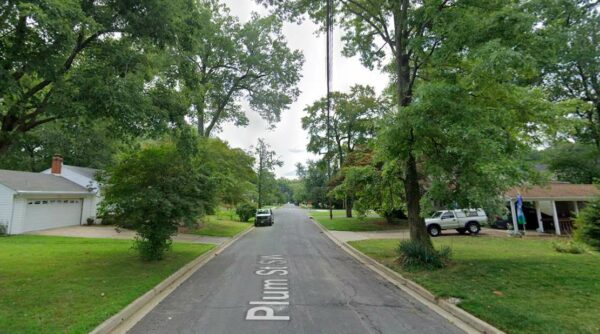
For much of Plum Street, pedestrians can travel on a sidewalk along one side of the road. But once it hits Cottage Street, pedestrians continuing southeast face a difficult choice: walk in the street or trespass on nearby lawns.
At a meeting on Monday (July 19), the Vienna Town Council authorized $388,000 in funding to resolve the dilemma once and for all and install sidewalks along Plum Street SW, Holmes Drive SW, and 503 & 505 Park Street SW. The Town Council also authorized $30,000 for a concrete maintenance contract for the new sidewalks.
The funding includes a 15% contingency in case costs run over during construction. The funding comes from former Councilmember Maud Robinson, who died in 2019 and set aside much of her estate in a trust to help the town she served complete its sidewalk network.
One casualty of the Plum Street sidewalk expansion will be a large oak tree on the street. Councilmember Howard Springsteen asked if the tree could be saved, but staff explained that the owner would not agree to an easement that would bypass the tree by going further into their property.
The street is also considered too narrow to bump the sidewalk out into the street without creating a traffic hazard.
The town also considered working around the tree with rubber sidewalks but determined that these would not be ADA compliant. The work would also ultimately end up irreparably damaging the roots of the tree the rubber sidewalk was ostensibly there to save.
The council unanimously approved new sidewalk construction, but Councilmember Nisha Patel said the town needed to consider focusing the sidewalk efforts around streets closer to downtown Vienna.
“We still have quite a few sidewalks in the heart of town that could use some improvements and upgrades for safety issues,” Patel said. “When we approach this Robinson Trust money, I would like us to prioritize sidewalks adjacent to Maple Avenue and one or two blocks out before we delve into smaller, safer streets that don’t necessarily need a sidewalk as badly.”
Mayor Linda Colbert noted that while downtown sidewalks definitely need work, the town also needed to consider which streets are routes to schools or connected to bus stops, making them likely for pedestrian use.
Photo via Google Maps
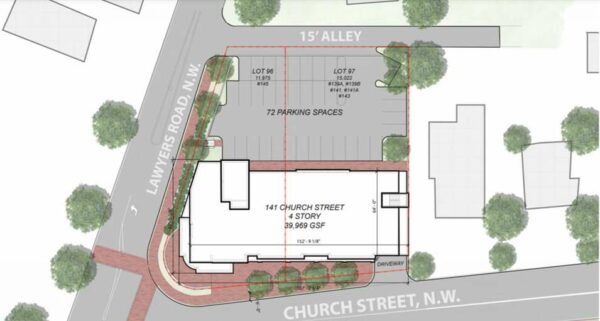
The developer that owns a cluster of retail and office properties on the corner of Church Street and Lawyers Road in Vienna wants to turn them into a single building with retail and apartments.
The Vienna Town Council heard a proposal from Bognet Construction and architectural firm MGMA during its conference session on Monday (June 14) that would redevelop 139-145 Church Street into a three-story mixed-use building with a basement.
Owned by Bognet Construction President and CEO Jim Bognet, the two parcels under consideration consist of 26,993 square feet, or 0.62 acres, of land, and each parcel is currently occupied by a two-story commercial building.
Under Bognet’s proposal, the existing buildings would be replaced by a 35-foot-tall building with 18 apartment units and six ground-floor commercial tenants.
The 39,969 gross square footage includes 9,448 square feet per residential floor, 9,378 square feet for ground-floor retail, an 804 square-foot rooftop area, and a 10,891 square-foot basement with retail, according to plans that the developer and architect presented to the town council.
Bognet says he purchased the properties approximately three years ago with the goal of studying the site for redevelopment.
“We’re looking at making it mixed-use, because it’s our understanding that there’s a demand in Vienna for different types of residential use,” Bognet told Tysons Reporter. “…We seem to have a large amount of single-family homes and townhouses coming to the market, but I felt there was a need for some apartment living, new apartments, so we’re going to try and fit that in with the Church Street Vision.”
The Church Street Vision is a zoning ordinance that the Vienna Town Council adopted in July 1999 to “enhance the appearance and economic vitality of businesses in the historic Church Street commercial corridor,” according to a town staff presentation.
The ordinance encourages property owners in the town’s C-1B Pedestrian Commercial Zone to mimic a late 19th-century, small-town architectural style in exchange for more square footage, parking requirement reductions, and a faster review process.
So far, Vienna has approved four projects under the Church Street Vision: 101 Church Street NW (home to Sushi Yoshi and Vienna Pet Spaw), 111-113 Church Street NW (Bazin’s and Blend 111), 114 Church Street NW (Red Galanga), and most recently in 2014, a building with ground-floor retail and second-floor apartments at 120 Church Street NW, whose tenants include Bard’s Alley and Rita’s.
Bognet says his team is currently working with the town to determine the appropriate amount of parking that should be provided by the new building and develop the design so that it fits the street’s overall aesthetic.
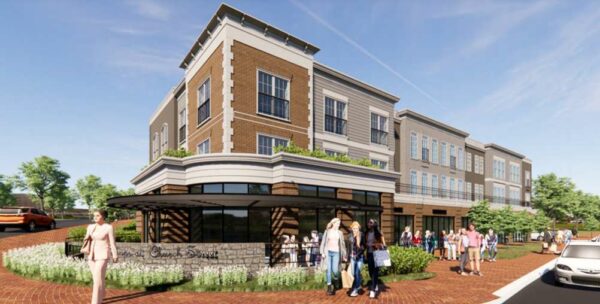
The conceptual plan proposes a total of 72 parking spaces, with 38 spaces on ground level and 34 spaces above that. The garage would be located behind the building, backing up against a 15-foot alley owned by the town.
Bognet says that, while the lot will be occupied by a single building, it will be “broken up every 20 to 25 feet” to look like different buildings from the street. Read More
The Vienna Town Council adopted a new budget for the 2021-2022 fiscal year last night (Monday) that decreases the town’s real estate tax rate for the first time in eight years.
At $43.2 million, the new budget increases funding by 5.4% over the adopted FY 2020-2021 budget, including a 6.9% increase in the General Fund to $26.5 million, but revenues remain 3.1% below the budget that had been proposed for FY 2020-2021 before the COVID-19 pandemic forced the town to revise its plans.
In a press release, the town says the funding increase in the budget for the next fiscal year “reflects a return to more normal post-pandemic operations” as Virginia rolls back public health restrictions amid an ongoing vaccination campaign.
“Last year at this time it was difficult to determine if we had budgeted sufficiently to meet the economic challenges of the pandemic,” Vienna Town Manager Mercury Payton said. “We were pleasantly surprised at how well Vienna survived the initial challenges and how well we are positioned to handle improving conditions.”
In particular, the Town of Vienna anticipates increases in revenue from real estate taxes and parks and recreation fees.
The new real estate tax rate of 22.25 cents per $100 of assessed value represents a quarter-cent drop from the current rate of 22.5 cents — the town’s first rate decrease since 2013 — but residents will still see a $72 increase in their tax bill, on average, due to rising property values.
Residents should also brace for higher water and sewer bills after the town council approved raising the rates by 4.3% to support a 6.1% increase in the water and sewer fund budget, which will be $10.8 million for the upcoming fiscal year.
According to the town, the increase in rates is necessary “to offset increasing costs of sewer treatment and to fund necessary infrastructure replacement.” The average resident’s water and sewer bill will go up by about $11.75 per quarter, amounting to a $47 annual increase.
While the budget was passed unanimously, Councilmember Ray Brill suggested the town should look for ways to reduce the water and sewer rates in the future as much as possible while still addressing the need to repair and refurbish infrastructure.
Federal relief from the American Rescue Plan Act could potentially assist with that goal, but the town is still awaiting guidance for how those funds can be used, Vienna Director of Finance Marion Serfass says.
“We’ll be looking for those opportunities,” she told the council.
The Town of Vienna will receive an estimated $14.9 million from the stimulus package, including approximately $46,900 that has been budgeted for the costs of software to support virtual meetings, but the remaining funds are not expected to arrive until fiscal year 2022, which starts on July 1.
The town says lans for utilizing the funds will be shared in a public hearing when the exact amount and distribution date are determined, and it will require an appropriation and budget amendment by the town council.
As part of the budget adoption, the town council voted to keep $97,000 in reserve for the Parks and Recreation Department with the expectation that the money will become available once COVID-19 restrictions lift and the department can ramp up its operations.
The council also moved to unfreeze $434,300 in funds that had been in reserve for the current fiscal year, including $359,300 for worker compensation increases and $75,000 to cover education and travel expenses for required recertification training for town police officers.
Thanks to efforts to conserve costs by having existing staff cover vacant positions and unexpected budget surpluses in business license and state revenues, the Town of Vienna is projecting a $294,000 surplus for FY 2020-21 of $294,000.
About $125,000 of those surplus funds will go to giving eligible employees a 3% salary increase retroactive to April 1 of this year.
“I’m glad we’re doing that. I think our employees need a raise,” Vienna Mayor Linda Colbert said. “I think they’ve been patient and understanding, but they’ve worked hard this year, so I’d like to see that happen.”
(Updated at 11:10 a.m.) The Town of Vienna’s election concluded yesterday (Tuesday) with all three incumbent councilmembers in contention retaining their seats.
Howard Springsteen, Steve Potter, and Nisha Patel were comfortably reelected in an election that saw turnout plummet after hitting a record high last year, when there was a mayoral race on the ballot and seven candidates vying for three town council seats.
This time, there were just four candidates competing for three seats, with Springsteen seeking his sixth term on the council and Potter and Patel looking to get reelected for the first time. Planning Commissioner David Patariu was the sole challenger.
In a statement to Tysons Reporter, Springsteen thanked voters for the support and vote of confidence.
“I am honored to serve and will always be available to Vienna residents to discuss issues of concern,” he said. “Congratulations to Steve Potter and Nisha Patel on their reelection to council. I look forward to working for the betterment of Vienna.”
In a Facebook post acknowledging the election’s results, Patariu says that, while he fell short of winning office, he believes his campaign helped bring attention to key issues, such as traffic on residential streets, the slow progress on funding sidewalk construction, and complaints about the town’s mulching operation on Beulah Road.
“I brought the Town Council’s focus back to issues facing residents,” Patariu said. “My dissent from the Town Council’s views on many of the issues above should provide a path for future action by residents.”
According to the Fairfax County Office of Elections, which managed the election, the unofficial vote totals are:
- Howard Springsteen: 1,217 votes
- Steve Potter: 1,181 votes
- Nisha Patel: 1,092 votes
- David Patariu: 750 votes
The results will be finalized after noon on Friday (May 7), when any remaining mailed ballots must be received.
1,968 out of 11,659 registered voters cast ballots in the election, amounting to a 16.9% turnout compared to the 36.5% of voters who participated in last year’s town election. 1,311 voters went to the polls in person on election day, while 657 people voted absentee, either by mail or in person.
Turnout for Vienna’s elections typically fell anywhere from 5% to 23% before the May 2020 election, which served as a prelude to a general election in November that also saw robust participation.
This election was notable, however, for being the last one that the Town of Vienna will ever hold in May. A bill passed by the Virginia General Assembly in February and signed by Gov. Ralph Northam on March 12 shifted all municipal elections in the state to November, starting on Jan. 1, 2022.
State Sen. Chap Petersen, who represents Vienna, and some town leaders took issue with the change, arguing that separate, town-only elections allow voters to focus on local issues, but the Fairfax County Office of Elections says the move will increase voter participation and save Vienna money, since the town currently has to reimburse the county for some election-related costs.
“The Turnout in future elections held in November will be much higher — as much as four-fold,” Fairfax County General Registrar Scott Konopasek told Tysons Reporter by email. “Whether or not that will change winners and losers remains to be seen.”
Photo courtesy Town of Vienna
New Police Chief to Speak at Public Input Session — Community members will get their first chance to talk to new Fairfax County Police Chief Kevin Davis at 7 p.m. on Thursday (May 6). Local civil rights groups have criticized Davis’s past record and a hiring process they say lacked transparency and public involvement, prompting the county board to issue a statement last night reaffirming its support for Davis. [Supervisor Rodney Lusk/Twitter]
COVID-19 Vaccine Could Soon Be Approved for Teens — “During a news briefing Friday, Virginia’s state vaccination coordinator Dr. Danny Avula said the CDC believes it is likely there will be an approved vaccine for ages 12 and up between mid-May to late May. Pfizer could be the first to get approval for ages 12 and up, followed by Moderna few weeks later, Avula said.” [Patch]
Cicadas Officially Emerge in Tysons — Brood X’s emergence began Monday night (May 3), when “more than 40 cicadas were spotted hanging off of branches just west of Tysons,” a periodical cicada expert told ABC7. The first cicada in the D.C. area appeared near Towson, Maryland, on April 19. [ABC7 News-WJLA]
Vienna Bans Plastic Bags for Yard Waste — The Vienna Town Council voted unanimously last week to eliminate the use of plastic bags for yard waste collection, following the lead of Fairfax County, which started enforcing its ban on April 19. Residents should instead utilize reusable containers or paper bags designed to hold leaves, grass clippings, and other yard waste. [Sun Gazette/Inside NoVA]
Vienna Contractor to Take on Private Health Care Providers — “Eight-year-old Vienna IT company Nolij Consulting has helped develop an electronic health records system for the Pentagon that serves 41,000 active users — and now it’s looking to take that expertise to the private sector.” [Washington Business Journal]
One of the fun aspects of local elections is the interesting intersection of national issues — like helping businesses recover from the pandemic — with hyperlocal problems, such as a too-loud mulch machine.
In a forum earlier this month, the four candidates running for Vienna Town Council met virtually to discuss top issues of importance, the first being the industrial mulching operation on Beulah Road. Candidates were asked whether they support removing the facility over the next two years.
David Patariu, a lawyer who was appointed to the Planning Commission in October 2019, came out swinging against the mulch operation.
“Two years is too long,” Patariu said. “It should have been removed last year.”
Patariu said with students learning from home in nearby residences, the 89-decibel operation sounds like a jet engine running in their neighbors’ back yard.
“We have to get rid of that right now,” Patariu said. “This is not a financial issue, it’s a moral issue. Residents in that part of town have suffered long enough.”
The other three candidates — incumbents Nisha Patel, Steve Potter, and Howard Springsteen — recognized the operation’s nuisance but said more work needs to be done to study the impact of shutting it down.
“Leaf collection is an important service, but mulching has raised concerns,” Patel said. “I’m hoping to get more information when we get a report from a consultant later this month. If leaf mulching is not cost effective, I would prefer to remove this aspect.”
Similarly, Springsteen said there’s more to consider that comes along with shutting down mulching.
“Do we buy or lease a new site, eliminate leaf collection, and transfer responsibility to residents, truck leaves for disposal, or leave as is?” Springsteen said. “I want us to look at the numbers. I know we’ve reduced [the noise] and that’s a step in the right direction.”
Potter said that for all its challenges, it’s important to recognize some of the benefits to local residents of leaf mulching.
“Leaf collection has been around for about 30 years now and a lot of citizens appreciate the service,” Potter said. “We must come up with a solution that is economical, ecologically sound, and move from there.”
Another issue facing Vienna is the continued need for improved water infrastructure. All four town council candidates said improving the town’s stormwater sewer infrastructure has to stay the top priority — along with traffic improvmeent.
“Getting water and sewer infrastructure organized is very important, but I also think traffic along Maple Avenue is another issue that needs to be dealt with,” Patel said. “[We’re] looking at infrastructure to be able to support [smart lights].”
Patel said the town is currently working on a project to synchronize lights on Maple Avenue, which could help improve traffic on the busy street.
“As far as water pipes are concerned, we need to replace the water pipes,” Patel said. “They were built in the ’50s and ’60s. We can’t continue to have water main breaks like we’ve been having.”
Because the pipes are so old, Springstreen said Fairfax County had no interest in taking over Vienna’s water infrastructure, so the town will have to handle it themselves.
“This system is not supported by taxes, but by user fees,” Springsteen said. “We need to replace our pipes. We have 63 miles of pipes, and we need to replace them as a pretty progressive rate. We need to make sure we don’t turn ourselves into Texas.” Read More
First Lady Northam Visits Tysons Mass Vaccine Site — “@FirstLadyVA Pamela Northam is visiting the mass vaccination site at Tysons Corner Mall, which just this week became the first vaccination site in Northern Virginia to allow walk up appointments. They are doing them Monday through Saturday, 9 AM to 4 PM.” [Tom Roussey ABC7/Twitter]
Primark Coming to Tysons Corner — The London-based clothing retailer Primark has signed a lease for a two-story, 37,100 square-foot store at Tysons Corner Center. Expected to open sometime between September 2023 and September 2024, the store will be Primark’s first in Virginia. The retailer prides itself on offering “amazing fashion at amazing prices,” but like other “fast fashion” brands, it has been criticized for exploitative labor practices. [Press release]
Vienna Plans to Lower Tax Rate — The Vienna Town Council signaled on Monday (April 26) that it supports reducing the town’s real estate tax rate by a quarter of a cent to 22.25 cents per $100 of assessed value. This would be the first time that the tax rate has changed from 22.5 cents per $100 in six years, but higher assessments mean that most homeowners will still see higher tax bills. [Sun Gazette/Inside NoVA]
Thoreau Principal Selection Process Underway — Fairfax County Public Schools officials held a community and staff meeting on the process to select a new principal for Thoreau Middle School. The school’s last principal, Yusef Azimi, was let go after police arrested him for reportedly failing to report child abuse allegations against a teacher. [Karl Frisch/Twitter]
Attorney General Allows Vaccination Requirements for Colleges — “In an official opinion Monday, Virginia Attorney General Mark Herring has concluded that Virginia colleges and universities ‘may condition in-person attendance on receipt of an approved COVID-19 vaccine during this time of pandemic.'” [Falls Church News-Press]


